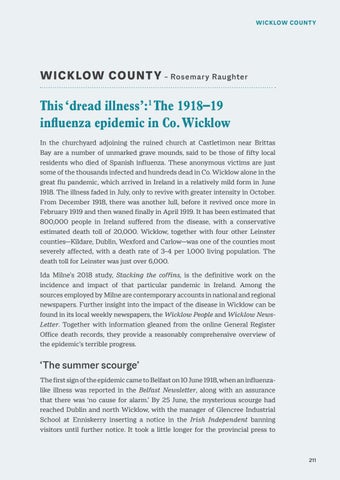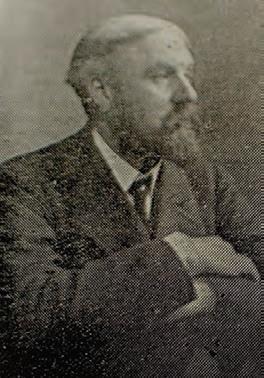WICKLOW COUNTY
WICKLOW COUNT Y – Rosemary Raughter
This ‘dread illness’:1 The 1918–19 influenza epidemic in Co. Wicklow In the churchyard adjoining the ruined church at Castletimon near Brittas Bay are a number of unmarked grave mounds, said to be those of fifty local residents who died of Spanish influenza. These anonymous victims are just some of the thousands infected and hundreds dead in Co. Wicklow alone in the great flu pandemic, which arrived in Ireland in a relatively mild form in June 1918. The illness faded in July, only to revive with greater intensity in October. From December 1918, there was another lull, before it revived once more in February 1919 and then waned finally in April 1919. It has been estimated that 800,000 people in Ireland suffered from the disease, with a conservative estimated death toll of 20,000. Wicklow, together with four other Leinster counties—Kildare, Dublin, Wexford and Carlow—was one of the counties most severely affected, with a death rate of 3–4 per 1,000 living population. The death toll for Leinster was just over 6,000. Ida Milne’s 2018 study, Stacking the coffins, is the definitive work on the incidence and impact of that particular pandemic in Ireland. Among the sources employed by Milne are contemporary accounts in national and regional newspapers. Further insight into the impact of the disease in Wicklow can be found in its local weekly newspapers, the Wicklow People and Wicklow NewsLetter. Together with information gleaned from the online General Register Office death records, they provide a reasonably comprehensive overview of the epidemic’s terrible progress.
‘The summer scourge’ The first sign of the epidemic came to Belfast on 10 June 1918, when an influenzalike illness was reported in the Belfast Newsletter, along with an assurance that there was ‘no cause for alarm.’ By 25 June, the mysterious scourge had reached Dublin and north Wicklow, with the manager of Glencree Industrial School at Enniskerry inserting a notice in the Irish Independent banning visitors until further notice. It took a little longer for the provincial press to
211




























